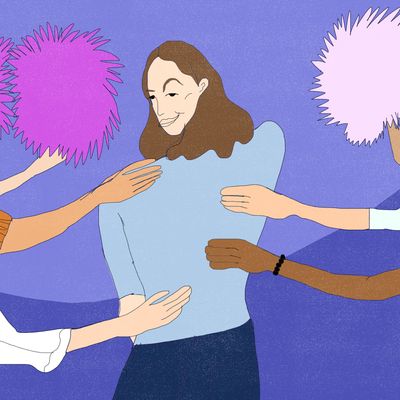
New York subscribers got exclusive early access to this story in our Brooding newsletter. Sign up here to get it in your inbox.
Years ago, someone remarked to me that parents often lag behind our own kids’ development. They change faster than our ability to keep up. Every few years, this person said, it’s good to make sure you’re adapting. Lately, I’ve been thinking about how this applies to friendship. As my kids have gotten older, and I have more freedom to think outside of my role as a parent, I’ve been wondering about how my platonic relationships will evolve, too. When the kids were little, all I wanted from my friends was support. I was too exhausted to think critically for fun. Effusive nodding was all I really had the energy for.
But as my kids get older, what now? It feels like the prevailing communication style among adult women — moms especially — is affirmation. Maybe this gels into place during the baby and toddler years, when we’re all just helping each other survive, and it’s hard to break the mold. Or maybe affirmation-based friendship is a wider phenomenon of our current moment, not exclusive to new moms. Maybe it’s related to our widely pathologized way of thinking about selfhood today as “healthy” or “unwell.” I notice this in the popular concept of “the three H’s” — the need to be either helped, heard, or hugged. There is a cautiousness innate in the way we seem to approach the self these days — be careful with me, we demand. I like to be handled with care as much as the next person, but I also wonder what we lose when we stick to validation instead of risking the consequences of directness when it comes to our close friends. As I look ahead into middle age, I suspect a change is inevitable, but I’m not sure how it will happen.
Affirmation culture came to mind while I read Sarah Manguso’s latest book, Liars, in which the protagonist, Jane, endures 15 years of an unhappy marriage with John, which ends when he cheats on her and then asks for a divorce. Liars is basically an anger diary. A significant amount of the book consists of lists of things Jane tidied around the house while seething with resentment, and the book deals exclusively with Jane’s perspective; we scarcely imagine John’s. While reading, I felt a bit coerced into that familiar motherly habit of effusive nodding.
Liars is compulsively readable, especially if you’re a heterosexual woman, but it’s also polarizing, and since its release two camps of readers have emerged: the fans who are grateful for a reprieve from having to hear about the male half of a marriage at all, and for whom Jane’s rage sounds like a clarion call for women to stop making themselves small and agreeable for the sake of a man’s comfort. And the detractors, including New Yorker book critic Parul Seghal, who took issue with Jane’s one-note martyrdom at the hands of John the villain, himself a bit of a caricature of masculine incompetence.
The characters lack the dimension needed to make the book really moving, Seghal argues. Seghal’s review was provocative, not just because it was “grumpy” (as she herself put it), but because to some, she appeared to be breaking an unwritten rule among women — and mothers in particular — that binds us together in solidarity against the world’s assholes.
The rule goes something like this: A woman who is the aggrieved party in a relationship with a man is entitled to affirmation from other women. Women in this situation are considered categorically blameless, because women are categorically blamed for so much. There’s a cosmic score being settled: Women have been fucked over by men for so long that we should get full immunity in our domestic disputes. Even in my longest-standing group text of moms, we have a little joke that if one of us were ever to drop in and admit to having committed a murder, we’d all reply, immediately and vehemently, that she was justified. Babe. You had no choice. The group text will defend its members, no questions asked, no matter how heinous the crime. Nothing can compel us to break the bonds of affirmation.
This is a rule based on fairly reductive black-and-white thinking, which Seghal points out. Reading her review, I sensed that I was witnessing a very profound breach of sisterly protocol; to criticize a book like Liars is to risk being considered a misogynist, to risk appearing to blame the victim. But I found her review thought-provoking, because this is an unspoken rule I’ve come up against before, in my own life. I’ve often felt that by insisting that women are in the right when we’re dealing with men, we’re denying ourselves the privilege of being the asshole. This seems unfair, almost a denial of part of our own humanity.
In her review, Seghal zeroed in on the acknowledgements at the end of Manguso’s book, where she thanks Chump Nation, a large, longstanding online community for people who have been cheated on, with its own lexicon and worldview with regards to infidelity. She wonders if Manguso’s decision to write a book from the exclusive, blistering perspective of a betrayed wife was influenced by the Chump Nation ethos, in which infidelity is considered a form of abuse.
I suspect that affirmation culture, whether it’s found in the group chat or in a long reply thread on Chump Nation, is endemic to social media as much as it is to new parenthood. Digital social platforms are containers for speech, and the speech that happens within them has to adjust to fit the container’s dimensions. In a text message, or on Instagram, or in a forum like Chump Nation, it is much easier to say, “You’re right, and I support you,” than it is to say, “You’re right, and I support you, but I also want to hold you, a person I respect and care about, to some degree of account.”
Several times over the course of Liars, Jane remarks that all the other married women she knows are just as miserable as she is. It must be marriage itself that’s the problem, she reasons — not her marriage. Her woman-friends seem more willing to commiserate with her than to propose alternatives, which is a circumstance I know well. This allows her to feel less alone, and also to stay miserable. The only person in Liars who strays from the affirmation script is Jane’s neighbor, who surprises her by asking, “Why do you stay with him?” This character is a man.
Years ago, I found a box of letters my mother wrote to my father in the 1970s, some of which describe attending “consciousness-raising sessions.” These gatherings, which often functioned as safe spaces where women hashed out their identities and futures outside the constraints of marriage and wifehood, were popular all over the world in the heat of feminism’s second wave. My mother described the sessions as sometimes very difficult. There were many arguments and disagreements, and it took a lot of energy to keep coming back week after week, but many women did, for years. I am sure affirmation and validation were important parts of what went on in these spaces, but the stakes felt high for these women, who could see the walls closing in around their lives if they followed in their own mothers’ footsteps. They demanded a lot of each other, and I suspect it’s because they felt they had no choice.
We’re better off in many ways than we were then, but I sometimes worry about what’s been lost, now that we rely so heavily on affirmation to offer each other support. Today, seeing so much as a period at the end of a sentence in a text message will send many of us into a spiral. We will do anything to avoid seeming mean, even going so far as to validate each others’ self-sabotage. But when I think about how I might try to be a brave one who chooses to deviate from the path of affirmation, I can’t seem to find the right words. If I had been friends with Manguso’s main character, Jane, I’d like to think I would have invited her to imagine a new life for herself. But I can’t be sure — I sure would hate for her to feel unsupported.
More From This Newsletter
- Can Divorce Make You a Better Parent?
- Is Homeschooling Isolating Us Too Much?
- Are You Being a Good Guest?





